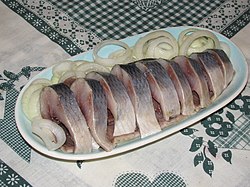Pickled herring
Pickled herring is one of the twelve dishes traditionally served at Christmas Eve in Russia, Poland, Lithuania, and Ukraine.
[1] Pickled herrings have been a staple in Northern Europe since medieval times, being a way to store and transport fish, especially necessary in meatless periods like Lent.
[2] In the Nordic countries, once the pickling process is finished and depending on which of the dozens of herring flavourings (mustard, onion, garlic, lingonberries etc.)
The herrings are ripened for a couple of days in oak barrels in a salty solution, or brine.
Red herring is similar to kippers but is whole and ungutted; it is more heavily salted and is smoked for 2-3 weeks.
Pickled herring can also be found in the cuisine of Hokkaidō in Japan, where families traditionally preserved large quantities for winter.
Pickled herring is rich in tyramine and thus should be avoided in the diet of people being treated with an antidepressant monoamine oxidase inhibitor.


